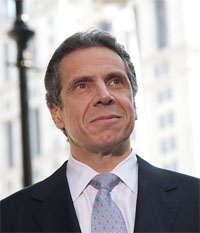Marriage bill in New York going down to the wire

Andrew Cuomo (Photo credit: Pat Arnow)
With only a few days remaining in the legislative session, marriage equality took a step closer to reality in New York State this week, as Governor Andrew Cuomo (D) sent a marriage bill to the State Legislature June 14, and the number of senators expressing their support edged to within one vote of that required for passage.
Governor Cuomo had previously said he would not introduce a bill if he did not believe it had the votes for passage. He said at a press conference June 13, “I believe the votes are there” to pass the bill.
Three Democratic state senators who had voted “no” on a marriage bill in 2009—Joseph Addabbo Jr. (D-Queens), Shirley Huntley (D-Queens), and Carl Kruger (D-Brooklyn)—said June 13 they would vote “yes.” All but one Democratic senator—Rubén Díaz (D-Bronx)—now support it.
The first two Republican senators also expressed their support this week: Senator James Alesi (R-Monroe) and Roy J. McDonald (R-Saratoga). Their votes give the measure a total of 31 of the 32 votes needed for passage.
Alesi had said at a press conference Monday that his support was contingent upon the bill “[taking] into consideration the concerns of religious groups and churches that they will not be forced to perform weddings that they feel they cannot do.” He said the provisions in the 2009 bill that addressed this would be adequate—provisions that said religious organizations would not be required to solemnize marriages of same-sex couples.
The religious exemptions in the bill from Governor Cuomo, however, go beyond those of the 2009 bill. The new bill says that religious groups “shall not be required to provide accommodations, advantages, facilities or privileges related to the solemnization or celebration of a marriage.”
As private organizations, however, religious groups are already free from state human rights laws that require only public “accommodations, advantages, facilities or privileges” to be open to all.
Senator Greg Ball (R-Putnam) had been one of those pushing for the additional provisions related to religious organizations—although he had also wanted protections for individuals and businesses that had religious objections.
Whether the language of the governor’s bill is enough for Ball remains an open question.
Ball is one of several Republican senators whom the New York Post on June 13 said were considering support of the bill. The Post cited “a highly knowledgeable Senate insider” who said “far more of the [GOP] members are in play than anyone realizes.” The others senators named as possible supporters were: Kemp Hannon (R-Nassau), Charles Fuscillo (R-Suffolk), Betty Little (R-Glens Falls), and Andrew Lanza (R-Staten Island), as well as Alesi and McDonald, who did declare their support.
Because passage in the Democrat-controlled Assembly seems more certain. A marriage equality bill has passed the Assembly three times in the past four years. Assembly Member Daniel O’Donnell (D-Manhattan) introduced a new marriage bill in that chamber in May, which has gained 68 sponsors, a record for a marriage equality bill.
O’Donnell’s bill exempted religious organizations only from solemnizing marriages but said nothing about facilities or accommodations. O’Donnell said in an interview that he would now be withdrawing his original bill and introducing the governor’s, which the Assembly Judiciary and Rules committees would likely consider on Wednesday, June 15.
Although Senate Majority Leader Dean Skelos (R-Nassau) opposes marriage equality, he has previously said he would let a marriage equality bill go to the floor. A spokesperson for Skelos’ office, however, said that the decision ultimately rests with the Senate Majority Conference, which could also meet on June 15.
Both chambers will need to act fast if there is any desire to pass a bill this legislative session, which ends June 20.


Leave a Reply